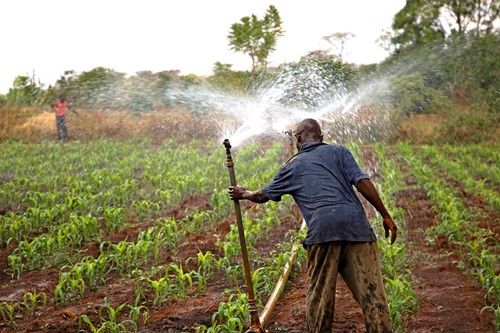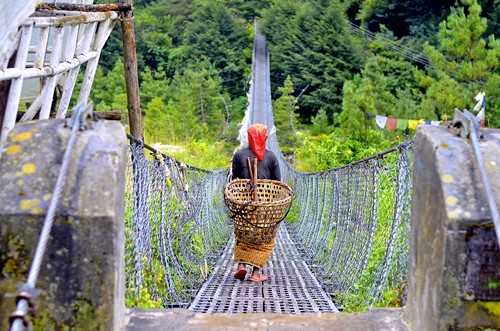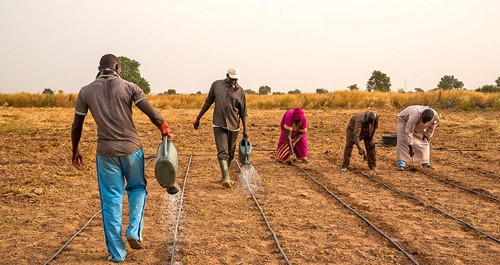Insight
Drawing on real-world project experiences to study the effects of climate resilience and market systems development interventions in Malawi and Nepal

Insight

In this piece, three of our MSc dissertation students in 2021-2022 reflect on their research and experience with NIRAS.
Bantu Mabaso

Prior to pursuing my MSc in Environmental Sustainability at the University of Edinburgh, I served as the Founder and Managing Director of the Phalala Youth Empowerment for Food Security, a social venture that aimed to promote food security by helping to build climate resilient capacity of smallholder farmers in Eswatini.
Working in partnership with NIRAS on my dissertation project offered me a unique opportunity to explore possible solutions to a challenge I have grappled with for a while which is how to monitor and evaluate climate resilience in smallholder farm systems more effectively to amplify the impact of programs designed to strengthen resilience. Using data collected through a household survey for the impact evaluation of the UK FCDO-funded Building Resilience and Adapting to Climate Change (BRACC) programme in Malawi, I was able to design a method for quantifying resilience in the form of a Farm Resilience Assessment Scorecard and applied it to the BRACC dataset to understand the extent to which assessing resilience using a tool such as this one can help development practitioners identify different levels of resilience and make decisions on how and where to scale appropriate interventions to increase resilience within farm systems. Through my research, I discovered that the proposed assessment tool is useful in helping practitioners gain a better understanding of changes in indicators of farm system resilience over time and can be used as a complementary tool to those that currently exist.
Working in collaboration with NIRAS was an enriching experience, through which I gained new insights and developed new skills I will put to use to help improve the environmental performance of development projects that aim to improve smallholder farm resilience. I am grateful that my research collaboration with NIRAS led me to produce knowledge that will be purposeful in helping to alleviate a problem I am passionate about solving.

Innocent Uwintwali

I joined NIRAS Group UK as an analyst working from the Edinburgh office in September after submitting my dissertation for the MSc in Food Security at the University of Edinburgh as a Mastercard Foundation Scholar. I had a great experience working on my dissertation with NIRAS, where I used data from the FCDO Commercial Agriculture for Smallholders and Agribusiness (CASA) programme, which NIRAS is implementing in Malawi and Nepal (and now is launching in Rwanda and Ethiopia).
I used regression models to evaluate and understand how specific components of the CASA Programme (e.g., farmer-buyer relationships, farmer-buyer contracts, access to training, etc.) influence fish and chicken production for smallholder farmers. Increases in farm income and farmer-buyer contracts were found to be the main predictors (among many other aspects of the CASA programme) of an increase in farm production, particularly in the aquaculture sector.
Working on a transdisciplinary programme like CASA and with a resource-rich institution and a global leader in the sustainable international development practice sector like NIRAS allowed me to explore my interests namely market system development in smallholder farming systems, food production policy analysis, global food trade policy analysis, and nutrition. I would recommend working with NIRAS to any postgraduate student who needs to work on an intellectually stimulating topic relevant to current international development challenges/debates while enjoying the support of a dynamic, welcoming, and highly experienced team of international development practice experts.

Julia Beier

My name is Julia and I’m from Germany. Over the past year, I’ve studied for an MSc in Ecological Economics at the University of Edinburgh. Throughout my studies, I’ve increasingly focused on how people are differently affected by climate change across spatial and demographic contexts as well as how to address these unequal impacts and reduce vulnerabilities.
In partnership with NIRAS, I explored how rural communities in Malawi perceive their level of resilience after participating climate resilience-building interventions. Since NIRAS was the Knowledge, Policy and Implementation Support Manager of the BRACC project, I was able to draw on a wide range of qualitative focus group discussion data, which enabled me to apply the novel concept of subjective resilience.
The study has shown that resilience capacities (adaptive, anticipatory, absorptive) were increased through the interventions which leads to community members feeling more resilient in the face of climate shocks now. However, they perceive their resilience to future climate shocks as uncertain. Improvements in livelihoods, food security, and environmental management were reported while markets remain inefficient from their perspective. Interestingly, this revealed deviations from the more objective, quantitative data as suggested in the literature. Even though the drivers of resilience perceptions couldn’t be fully explored, aspirations regarding livelihoods and improvements in self-efficacy were found, which can lead to the uptake of better resilience strategies.

NIRAS welcomes interested postgraduate students to reach out to us with their ideas for research projects. Postgraduate students studying in the UK may get in touch with the NIRAS UK student placement coordinator, Mackenzie Klema, at mack@niras.com to discuss a potential collaboration.
